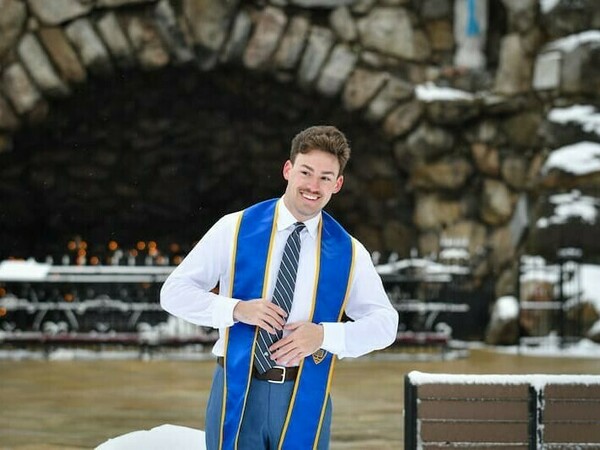
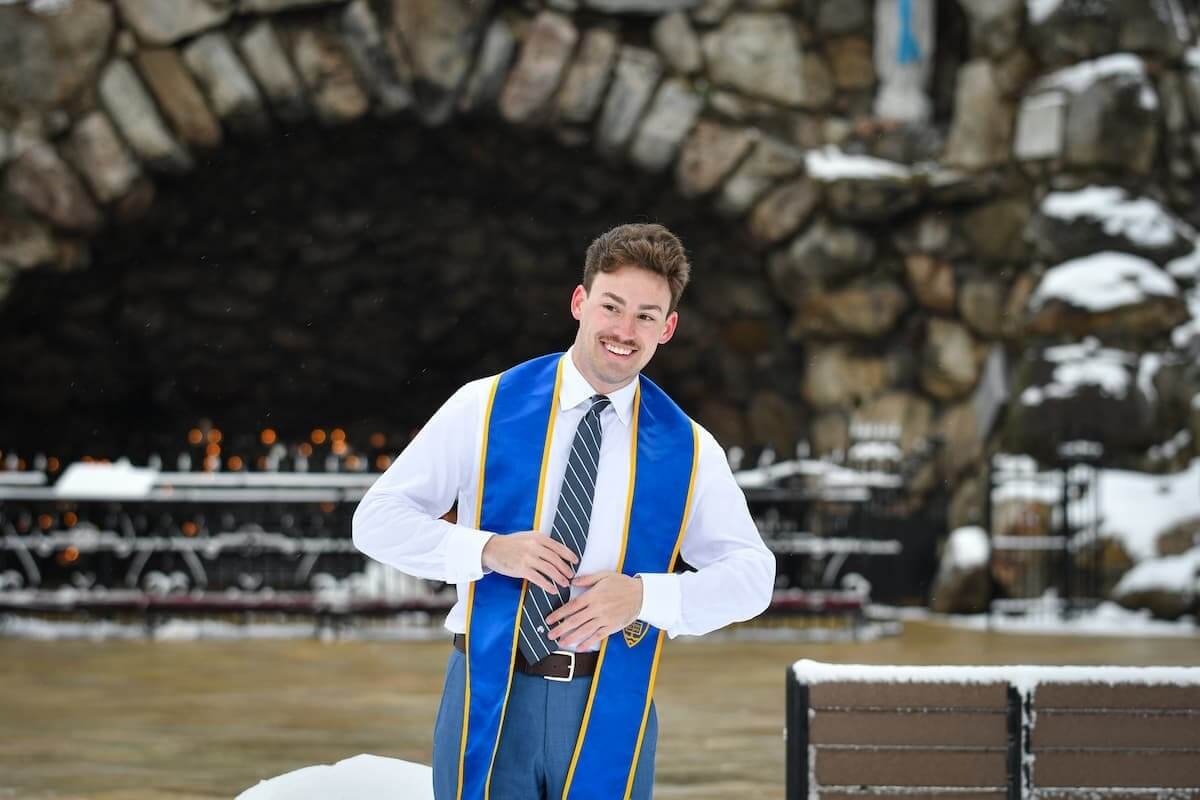
When the time came to select his senior thesis topic, Noah Bongiovanni picked a subject that has fascinated him ever since he was 12 years old and learned he had a rare ability — perfect pitch.
The Notre Dame music and Arts & Letters pre-health major focused his research on how adults identify and recall musical notes, particularly when presented in different keys and octaves and played by different instruments.
“Perfect pitch is essentially the ability to hear colors the same way you can see them. Nobody needs a color wheel in their back pocket to look up and see the sky is blue,” he said. “Not having perfect pitch is like looking around the room and seeing all the different colors but not knowing what any of them are.
“It’s fascinating, and obviously the big question is ‘Why is it this way? And how do we crack it?’”
The deep dive into perfect pitch enabled Bongiovanni to combine his passion for music with his love of science — and resulted in his work as an undergraduate being published in two academic journals. His senior thesis, “Generalizing across tonal context, timbre, and octave in rapid absolute pitch training,” was published online in January in Attention, Perception, & Psychophysics, a Psychonomic Society journal, and a second paper based on the continuation of his research has been published by a sister journal, Memory & Cognition.
Extensively exploring an unusual topic alongside people who are similarly passionate about it was the perfect culmination of Notre Dame career, Bongiovanni said. Throughout his time on campus, and especially in the Glynn Family Honors Program, he continually encountered academic programs that provided both intellectual rigor and surprising inspiration.
It’s a combination that propelled him through a yearlong seminar reading the great books of Western civilization, hours in the chemistry lab and practice room, and days spent writing code to interpret the data from his experiments.
“One of the first things that I learned at Notre Dame — and it remains my favorite thing about Notre Dame — is that no matter what the subject matter is, you can have the most intelligent, poignant conversations with anybody, about anything, at any time,” he said. “You could be in class, at the dining hall, or sitting around your room late at night just thinking about things — everybody just wants to learn and to consider things critically.”
Humble beginnings
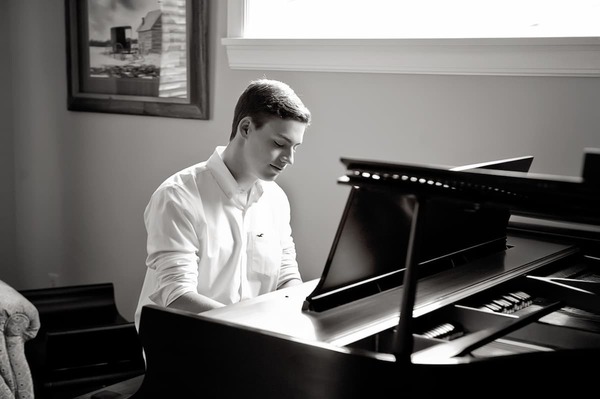
At his home studio inside his apartment, Bongiovanni has an array of keyboards, a drum set, and a ukulele — along with a saxophone stashed under his bed and another seven instruments in his closet.
“I’m sure I drive my downstairs neighbors crazy,” he quipped.
His first encounter with music came early, but it took some time for it to become his passion. Bongiovanni began taking weekly piano lessons at age 3 with a Catholic nun — he didn’t enjoy them much at first, but neither his parents nor Sister Mary Irene let him quit until he had spent several years learning the instrument.
Eventually, as his technique and musicality developed, he was allowed to play more of the music he wanted and his sessions with his instructor became a collaboration.
From his early years practicing scales and arpeggios, he learned how to apply his diligence and perseverance to other tasks. His research into perfect pitch regularly calls upon those skills since, as he explained, it is a difficult subject to investigate with likely little practical application.
“I’m studying it because I think it’s a fascinating thing to explore how the human brain works,” Bongiovanni said. “I love it because music and this ability of perfect pitch have given me such a gift in my lifetime.”
Campfire songs
As his Notre Dame classmates were joining labs and conducting the research which would be the basis for their senior thesis projects, Bongiovanni went searching for scholarship on perfect pitch in a biomedical and life science database.
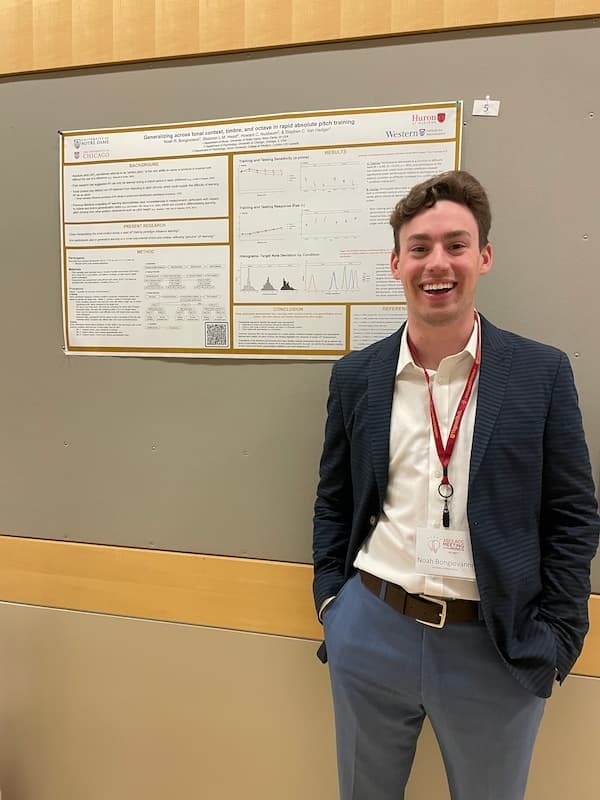
He discovered the work of Stephen C. Van Hedger, a former Ph.D. student and faculty member at the University of Chicago and now an assistant professor at Huron University in Ontario.
Bongiovanni connected with Van Hedger and spent the summer of 2021 living and working in Chicago, with the support of a grant from the Glynn program. There, he ran a series of experiments to determine if test subjects could identify the C tone from amongst a series of various keys and different instruments.
His findings built upon Van Hedger’s 2019 work which showed some adults could in fact learn perfect pitch.
“The major contribution of my work to this field was that we discovered if you don’t accurately test the skills that perfect pitch requires, you can end up making claims about perfect pitch without measuring what you’re supposed to,” Bongiovanni said.
Ironically, when Bongiovanni was first told he had perfect pitch, he wasn’t even sure what that meant.
While stuck inside during a rainy day at summer camp, Bongiovanni was noodling on a guitar when a friend started playing some campfire song recordings on a phone. Bongiovanni listened for a few seconds, then perfectly plucked out the melody on his guitar.
His friend was amazed and told him he had perfect pitch — but Bongiovanni’s response was “What’s that?” Back home, the family’s piano tuner confirmed the finding.
Now, his research is exploring if adults can acquire the same ability.
“We’re finding out in this research that everybody’s got a shot,” he said, “and if I’m part of the team that figures out perfect pitch, I’d be thrilled.”
Unexpected modulation
Bongiovanni’s research dovetailed with his desire to build a career in the medical field but while he was designing, conducting and interpreting the results of his pitch recall experiments, his studies in pre-health became personal.
In the summer of 2020, an encounter with mold triggered an aggressive inflammatory reaction known as a mast cell disorder. Eating, exercising, sleeping, and experiencing stress could induce allergic reactions including his throat swelling shut, panic attacks that lasted for days, and losing consciousness.
Bongiovanni and his doctors were able to get his condition under control so he could go to Chicago to conduct more research. He returned to Notre Dame looking forward to his senior year, but he contracted mononucleosis which brought the symptoms back and forced him to take a leave of absence in spring 2022.
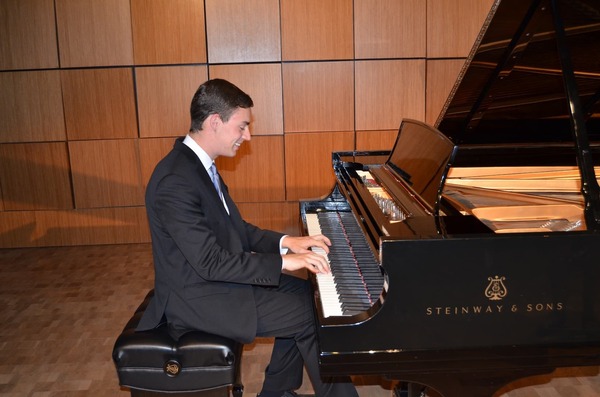
In dealing with his health issues, Bongiovanni questioned whether he belonged at the University. But his commitment to his education and the Notre Dame community’s support gave him strength. When he again recovered his health, he went back to school to finish his final courses and perform his senior recital in 2022.
Four months later, Bongiovanni became a Guinness World Record holder when he identified 57 musical notes in a minute, shattering the previous record.
His commitment to pursue the study of medicine is even stronger now, but he is currently following his doctor’s advice and forgoing medical school for at least another year to concentrate on staying healthy. In the meantime, he’s been working on new research with Van Hedger and Berthold Hoeckner, chair of Notre Dame’s Department of Music.
“It’s such a privilege to be able to do things in life that you’re passionate about, and I pray that everybody finds what that thing is,” Bongiovanni said. “I may not pursue the study of perfect pitch as a career, but I have been able to spend a little while doing something that is so interesting and special — and Notre Dame and the Glynn program made that possible.”
Originally published by at al.nd.edu on August 17, 2023.